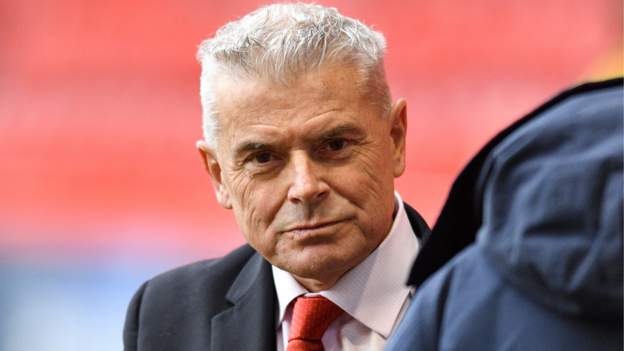It’s now over two weeks since Jim Goodwin walked down the Easter Road pitch with his bag over his shoulder, before climbing over a cartoon cat on an advertising board and ignominiously leaving the stadium.
Since that undignified exit as Aberdeen manager, there has been a strange silence about who might replace him. The usual rumour mill which goes into frenzied overdrive when a manager departs has been oddly quiet.
The Aberdeen board – or the infamous ‘football monitoring board’, to be precise – have clearly ordained to take their time, with reports suggesting interim boss Barry Robson could be given an extended audition.
That makes sense since Goodwin, and Stephen Glass before him, lasted 11 months in the job. Chairman Dave Cormack can ill-afford to get this appointment wrong, or risks his whole premiership turning extremely sour.
Patience leaves time for due diligence and careful thought. But the time taken also suggests the club don’t know what type of manager they want next. So what type of manager should they want?
It’s a question which needs introspection on the way the whole football club operates. Given Glass was a rookie in first-team management and Goodwin was still very much in the early days of his managerial career, the common cry is Aberdeen now need an experienced hand.
But experience in what? Hands-on coaching? Implementing a certain style throughout the club? Finding and recruiting players? Leading and setting a culture?
Not all ‘managers’ do all these things at clubs. In many elite clubs these days, managers or head coaches have input in many areas, but only deal in detail with the first team.
Do Aberdeen want an experienced manager who has control of everything? That appeared to be what Derek McInnes did during his eight years at the club, bringing his own head of recruitment, Russ Richardson, with him while developing other parts of the football operation.
It was hugely successful for six years, before things seemed to go stale as signings failed to make an impact and results turned. That is the dilemma again for Aberdeen.
Another experienced manager with a good track record – and inevitably some failures – is likely to come looking for control with an established way of working.
If they choose well, it could be transformational to put the keys in safe hands. But even then, when that manager inevitably moves on, the whole football department and first-team squad will be turned inside out as the next arrives. And that’s if it goes well.
Recent evidence at Pittodrie shows moving on from a dominant figurehead is fraught with danger, and cost, and there are other examples – see Manchester United post Sir Alex Ferguson and Arsenal after Arsene Wenger.
That’s one of the reasons Aberdeen changed their football structure after McInnes’ departure. Steven Gunn was promoted to director of football and the aim seemed to be to spread responsibility around, to mark a more seamless transition as managers or head coaches come and go.
But with Gunn inexperienced in his new role, Glass starting his tenure without a head of recruitment in place, and both he and Goodwin allowed to bring in generally inexperienced assistant coaches, the restructure was built on sand.
And while there have been undoubted recruitment successes in both sales and purchases, Aberdeen have fielded the youngest average starting XI in the Premiership this season. Inexperience all round.
The club’s football vision – set out to fans in 2020 – was to “inspire our supporters by winning through an exciting brand of football with intensity and pace, and homegrown talent at its core”.
If that’s still the vision, then the next manager surely has to have a track record of doing that. Glass and Goodwin clearly had their own strengths, but neither had a clear history of producing what the club itself laid out.
There is a competitive – if imperfect – squad at Pittodrie, as has been seen at times this season. So it would be safe to assume someone who, either personally or through an experienced backroom team of coaches, can improve players and shape a better team structure.
Assuming Cormack doesn’t want to bin the current look of the football department, the new manager or head coach will need to fit in too. But whether it’s a veteran with more than 500 games under his belt, a younger manager with a burgeoning reputation, or a promotion within the club – like Robson – they need the right tools to do the job.
It’s not just about the manager for Aberdeen. There are so many questions to consider, and the clock is ticking.




